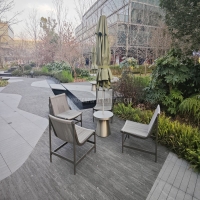Welcome to the website for landscape facilities products and knowledge.
How do landscape bar counters in commercial settings comply with health and safety regulations?
In commercial environments such as hotels, restaurants, and entertainment venues, landscape bar counters serve as both functional service points and aesthetic focal areas. However, their design and operation must strictly adhere to health and safety regulations to ensure public welfare and legal compliance. This involves multiple considerations, from material selection and structural integrity to hygiene protocols and operational guidelines.
Material selection is paramount. Surfaces that frequently contact food, beverages, or human touch must be made of non-porous, easy-to-clean materials like quartz, stainless steel, or treated solid surfaces. These materials resist bacterial growth, prevent liquid absorption, and withstand rigorous cleaning with chemical disinfectants without degrading. Regulations often specify that these surfaces must have seamless integration or tightly sealed joints to avoid dirt traps.
Structural safety is another critical aspect. The counter's design must eliminate sharp edges or corners that could cause injury, particularly in high-traffic areas. The height and overhang of the counter should allow comfortable and safe interaction between staff and customers. Additionally, the counter must be structurally sound to support heavy equipment like glass washers or espresso machines, preventing collapse or instability.
Hygiene and sanitation protocols are rigorously enforced. Commercial landscape bars must facilitate easy and frequent cleaning. This includes providing adequate access for staff to clean all areas, incorporating integrated sinks with hot and cold water for handwashing and utensil cleaning, and ensuring waste disposal is discreet yet accessible for regular removal. In many jurisdictions, health codes require specific clearance distances between potential contaminants (like trash bins) and preparation surfaces.
Electrical and plumbing safety is integrated discreetly. For bars equipped with electrical outlets for blenders or lighting, regulations mandate the use of GFCI (Ground Fault Circuit Interrupter) outlets to prevent electrocution, especially in areas prone to liquid spills. Plumbing for sinks must be designed to prevent backflow, avoiding contamination of the water supply.
Operational compliance involves staff training. Employees must be trained in food safety practices, including proper handwashing techniques, safe food handling, and regular cleaning schedules. The counter layout should promote an efficient workflow that minimizes cross-contamination—for instance, separating areas for clean glass storage from dirty dish returns.
Accessibility regulations also play a role. In many countries, commercial counters must be designed to accommodate customers with disabilities, which might include specifying a portion of the counter at a lower height for wheelchair access.
Finally, regular inspections by health and safety authorities ensure ongoing compliance. Establishments must maintain records of cleaning schedules, equipment maintenance, and staff training certifications. Non-compliance can result in fines, closure, or legal liability in case of accidents.
By integrating these elements—durable materials, safe design, strict hygiene measures, and trained operations—landscape bar counters achieve full compliance without sacrificing aesthetic appeal, ensuring they are both beautiful and safe for commercial use.
Related search:

Recommendation
Metal structure rattan chair without armrests for single person, with woven seat and backrest.